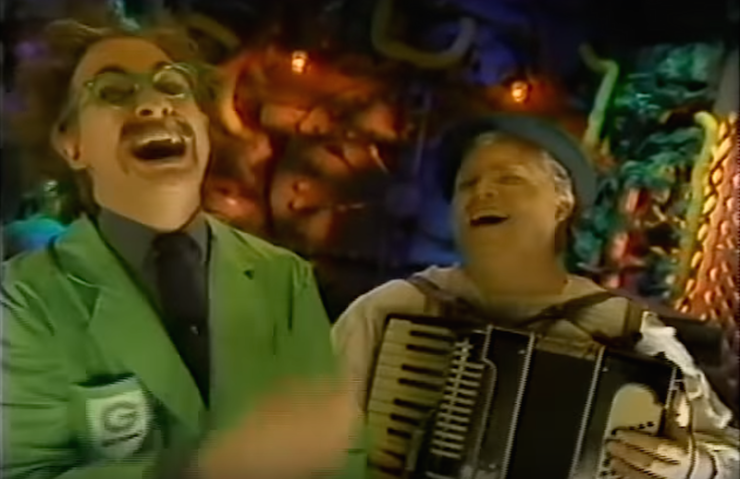Thirty years ago, on November 24, 1988, Mystery Science Theater 3000 premiered on KTMA, a cable access channel in Minneapolis. This very Thanksgiving is the show’s anniversary. It’s out of college by now (probably), maybe trying to buy a home, or start a family. It bristles when Cheers calls it a millennial—it’s always felt like an old soul, with the references to Get Christie Love and Charlie McCarthy, and it gets frustrated when other shows consider it shallow. It’s not just a reference factory, after all. There’s real depth and heart here, if you know how to pay attention.
I’d been hearing about Mystery Science Theater 3000 for a few months. At the time, I wanted to be a movie director, and I read a lot of film and entertainment magazines, and a lot of people kept mentioning this show with an odd name in their interviews. But our cable package didn’t have the channel that aired it, which was either Ha! or the Comedy Channel, or maybe Comedy Central? The channels had merged or changed names, I wasn’t sure which. (If you want to know exactly what happened there, more about the show’s storied history is available here.)
I think I saw a clip of MST3K on MTV once during a free preview. But the first time I really watched the show, really communed with it, was a much more profound experience. I was sleeping over at a friend’s, me and another girl. It was the thing that sometimes happened where I was the best friend of one or both of them, but sometimes, for reasons that eluded me, the other two would ally against me, decide that they were “cool” and I was not, and that I needed to be prodded for my uncoolness. This was one such night.
This was also a time in my life when my diet consisted primarily of Twinkies, Snickers, and Mountain Dew (I’m also confused by the persistence of my teeth, thank you for asking) so when I say I was “sleeping over” at my friend’s what I actually mean is that when the other girls got sleepy and went to our hostess’ bedroom to crash, I stayed awake, stung by their rejection, staring into the darkness outside and twitching intermittently. At a certain point I figured I might as well gaze into the television instead of the void.
My friend had Ha!/Comedy Channel/Comedy Central/Whatever It Was, and a graveyard shift MST3K re-run was just about to begin.
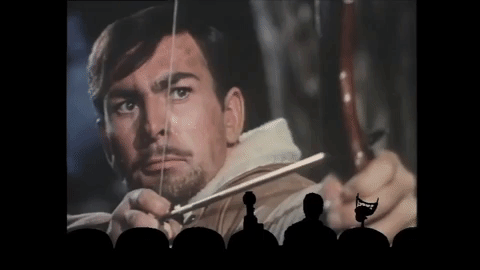
I get nervous when I talk about The Media That Changed My Life. On the one hand, it’s just a book/song/TV show/movie, and even on a pop culture website, it can feel absurd to talk about them like they’re historic events. The stock market crash of 1929 changed peoples’ lives. The Berlin Wall coming down changed people’s lives. The Chinese invasion of Tibet changed peoples’ lives. The Chernobyl meltdown changed peoples’ lives. I’m talking about a cowtown puppet show, here. But on the other, these books/songs/TV shows/movies are what we have to connect with each other. They’re the best ways we’ve found so far to feel less alone. This is my life that I’m living here, my head that I’m stuck inside. And after I watched that puppet show, life inside this head got a little easier.
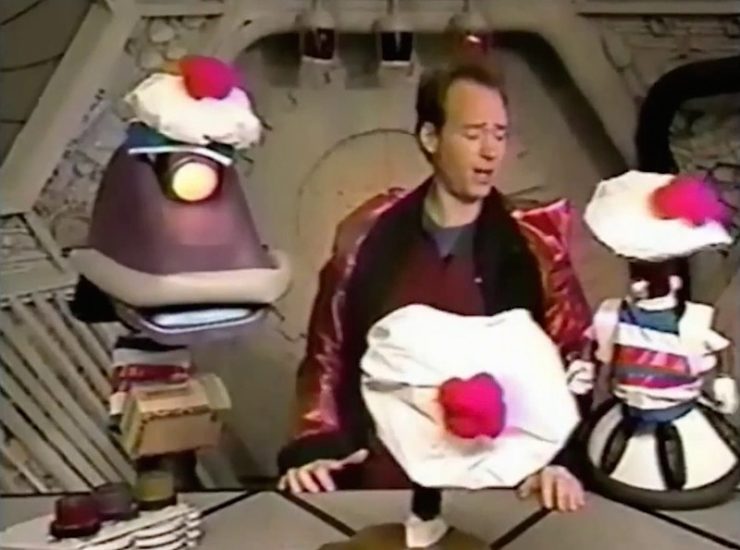
I had been warned not to wake my friend’s mother, asleep in her room down the hall. I also didn’t want to wake my already-irritated friends. So the volume needed to be ticked down as low as possible, but as those of you who know the show will realize, trying to hear both the film and the commentary can be difficult even when you don’t have any restrictions. So imagine me toggling frantically between “way too low,” and “not quite loud enough to hear,” missing half the jokes, not able to rewind because that’s not how TV worked back then, all while I’m experiencing the rhythm and structure of the show for the first time.
Imagine me close enough to the screen that my eyelashes are brushing against the Bots’ faces.
Imagine me pressing a pillow into my face as I snort and choke on my own laughter, glancing back at the various closed bedroom doors, hoping that no one can hear my paroxysms of happiness.
Because here’s the thing: despite all the complications, this was the funniest thing I’d ever seen. It was humor as revelation. It was loving and snarky and a little angry. It was relentlessly regional. It was Operation: Double 007.
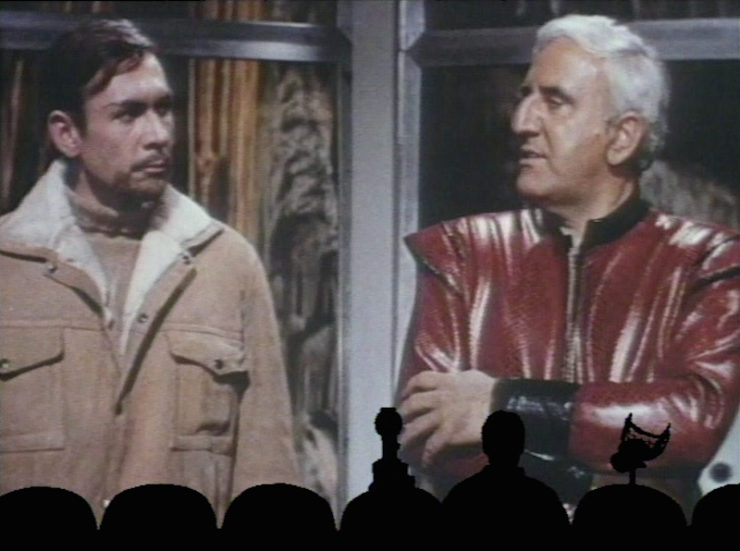
This was a film whose reason for being was to make a star out of the hapless Neil Connery, Sean Connery’s younger brother, by trading on the family connection and having MI-6 members refer to his fictional character, who is also named “Neil Connery,” as “the brother of our top agent”—raising pretty severe existential questions about Sean Connery’s career, the James Bond Cinematic Universe, and, truly, the structure of reality itself.
Oddly enough, this gambit fails. The film never quite comes together, and the Other Connery never makes the case for himself as the next suave action star. It might be that since his character is a plastic surgeon and not, you know, a spy, it’s a touch unbelievable that he’s up to international espionage. But mostly it’s the fact that his greatest skill is lip reading, and that this actually becomes pivotal to the film’s plot. If you’re thinking that the film is funny on its own merits, you’re correct.
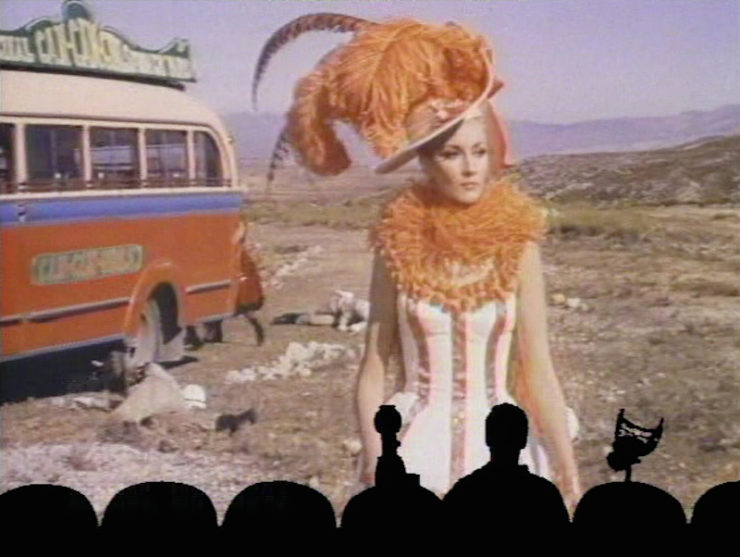
But mostly that night, it was the way Joel and the Bots pointed out the film’s absurdities. At one point one of the off-brand Bond girls scoffs at Neil’s warnings of evil plots, saying, “You’ve read too many novels by Fleming.” There are plenty of ways one could respond to such a clunky line, but Crow plunges a dagger into the film by snapping: “Jerry Fleming, Ian’s brother.” The way it took the film’s clumsy attempt at clever meta-commentary and upped it. The way Joel and the Bots pushed back against the film’s smug misogyny. The way the host segments were ramshackle and proudly low budget. The way the jokes ranged all over the map, from the predictable Bond film references (which I got, thanks to my dad) to riffs on the barnstorming drama The Great Waldo Pepper (my dad again), SNL writer Michael O’Donoghue, classic sitcoms, classical art, to Hee Haw, Vonnegut, Zappa and Zardoz. It was the first time anyone else knew what Zardoz was. (This episode also introduced me to Torgo, which must have been baffling?)
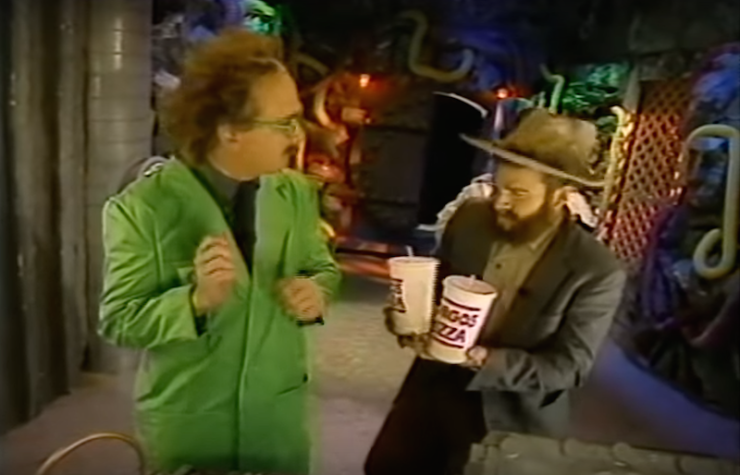
The way the writers made room for erudition and silliness, and expected their audience to accept the show just as it was.
That was the night that made me love the show. It was private, secret, a TV show just for me alone in the dark.
Here was a group of adults who had made lives in comedy, and who were all working together in the middle of the country, far away from the Hollywood of my entertainment magazines and the Manhattan of my film journals, to make something greater than the sum of its parts. To create a weekly love letter to moviemaking itself by pointing out places where films fell short of their goals, loving pokes to films that clearly loved their genres like Gamera and assorted giant insect movies, harsher jabs to films, like Operation Double 007, that disrespected the intelligence of the audience.
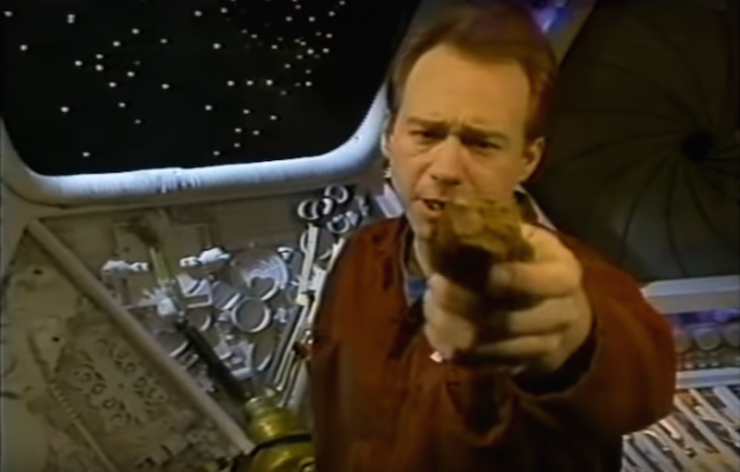
Here was a group of comedians who respected me, who trusted me to get the jokes, who made it clear that being a girl or being queer or being unpopular didn’t matter—cause I was smart. Here was a group of geeks who would accept me in all my weirdness, who would get my jokes and teach me new ones.
And for thirty years, they’ve been making me feel less alone.










